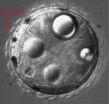(Press-News.org) Vampires on the True Blood television series are already enjoying the advantages of synthetic blood. While this may seem to be only the imagination on the big screen, the true benefits of blood manufactured from embryonic stem cells may be less than a decade away.
It is unclear however whether society can develop an acceptance of cultured blood - or an appetite for synthetic meat produced by related technology. For this reason it is vital the public has every opportunity to get involved with the latest developments in stem cell research, say researchers from the Economic and Social Research Council's (ESRC) Genomics Network.
Clips from the hugely popular True Blood TV show as well as the Twilight book and film series will provide a starting point for debate on recent biotechnology developments, including stem cell research, at a public event organised as part of the ESRC's Festival of Social Science 2011.
The audience will be able to discuss a range of issues from Twilight's 'vegetarian vampires' to the possibilities of 'in vitro' meat. "The fact that synthetic blood features so prominently in the True Blood series is a great opportunity to get a new - particularly younger audience - thinking about these issues," emphasises Dr Christine Knight. "The biotechnology developments that enable production of blood and meat in the laboratory are likely to affect all of us in the coming years." For example, the potential to manufacture blood on demand for use in transfusions (up to 2 million units are needed a year) from embryonic stem cells could be a reality in just a decade from now.
However, research undertaken by the Genomics Network indicates that gathering public reactions to potential stem cell products will be key to the understanding some of the barriers encountered when introducing these products into a consumer market. Stem cell research is still considered controversial or unacceptable by some communities. "It's vital that the impact of these technologies on society is taken into account - that people understand what's involved and have the chance to learn about how and why technologies such as stem-cell derived blood products or synthetic meat are being developed.," says event speaker, Miss Emma King
Discussion of these issues, event speaker Dr Neil Stephens confirms, is crucial at this point in time. "Tissue engineering techniques could soon be applied to the production of food, producing in laboratories meat that has at no point has been part of a living animal. While at present vast technical challenges remain to the successful production of in vitro meat, the technology raises many questions for scientists, regulators and consumers to which there are no clear answers."
"It is entirely possible," he continues, "that with adequate funding in vitro meat could find a route to consumer markets and into human diets. It is equally possible that the technology could be wholly rejected by the consuming public, or might never move beyond the current stage of basic laboratory research. Will in vitro meat ever be a food, or just a Frankensteinian scientific misadventure? These are the sort of questions we need to be asking."
Organisers hope to draw a wide audience to this event, ranging from fans of vampire fiction and film, to those interested in the social and cultural impact of these technologies. Social scientists will be on hand to present the latest findings on in vitro blood and meat, stem cell research, as well as debate their potential impact on society.
INFORMATION:
For further information contact
Dr Christine Knight
Email: christine.knight@ed.ac.uk
Telephone 0131 6514743
ESRC Press Office:
Danielle Moore
Email: danielle.moore@esrc.ac.uk
Telephone 01793 413122
Jeanine Woolley
Email: jeanine.woolley@esrc.ac.uk
Telephone 01793 413119
Notes for editors:
Vampires and vegetarianism in the 21st century
Organiser: Dr Christine Knight
Date: 1 November 2011 16.00-18.00
Venue: Rich Mix, Bethnal Green Road, London
Audience: Suitable for the general public
For more information: Vampires and vegetarianism in the 21st century
This press release is based on findings from a range of projects currently undertaken within the ESRC Genomics Network (EGN). The EGN is a £25 million investment by the Economic and Social Research Council (ESRC) - dedicated to examining the development and use of the science and technologies of genomics. The activities of the EGN encompass the whole field of genomics, covering areas as diverse as DNA profiling and identity politics, plant and animal genetics, personal genomics, embryonic stem cell research, and synthetic biology. The EGN spans five of the UK's leading universities, and involves more than a hundred researchers, from professors to PhD students, as well as an international cast of visiting research fellows. It is one of the biggest social science investments in the ESRC's current portfolio, and has grown into the largest concentration of social scientific research on genomics in the world. More at www.genomicsnetwork.ac.uk
The Festival of Social Science is run by the Economic and Social Research Council which runs from 29 October to 5 November 2011. With events from some of the country's leading social scientists, the Festival celebrates the very best of British social science research and how it influences our social, economic and political lives - both now and in the future. This year's Festival of Social Science has over 130 creative and exciting events aimed at encouraging businesses, charities, government agencies; and schools or college students to discuss, discover and debate topical social science issues. Press releases detailing some of the varied events are available at the Festival website. You can now follow updates from the Festival on twitter using #esrcfestival
The Economic and Social Research Council (ESRC) is the UK's largest organisation for funding research on economic and social issues. It supports independent, high quality research which has an impact on business, the public sector and the third sector. The ESRC's total budget for 2011/12 is £203 million. At any one time the ESRC supports over 4,000 researchers and postgraduate students in academic institutions and independent research institutes. More at www.esrc.ac.uk
END
Young adults who were born prematurely show multiple biological signs of risks to future health, research from Imperial College London has found. The scientists, reporting their findings tomorrow in the journal Pediatric Research, say that the research indicates that urgent work is now needed to monitor preterm babies into adulthood to improve the detection of early signs of disease.
The study of 48 volunteers aged 18-27 found that those who were born at 33 weeks of gestation or less had higher blood pressure, more fat tissue despite having a normal Body Mass Index, and ...
A new study has shown that racehorses are extremely sensitive to changes in daily light and, contrary to humans, can adapt very quickly to sudden shifts in the 24-hour light-dark cycle, such as those resulting from a transmeridian flight, with unexpected benefits on their physical performance.
The research led by academics in the University of Bristol's Faculty of Medical and Veterinary Sciences is published in the Journal of Neuroendocrinology.
This is the first study of its kind to investigate the effects of jetlag on the physiology and performance of racehorses ...
Despite substantial reductions in the hospital death rates for heart attack patients across all age groups, there are still worrying inequalities in heart attack management for the elderly, a new study has shown.
The research, carried out by the University of Leeds, UK and funded by the British Heart Foundation, showed that the risk of a heart patient dying in hospital almost halved across all age groups between 2003 and 2010. Specialist treatments – such as coronary angioplasty – to open blocked or narrowed arteries that supply blood to the heart are also much more widely ...
The research program AQUA Palawana has been exploring the unique freshwater biodiversity of the Philippine Island and biosphere reserve of Palawan for more than a decade. Scientists from the Senckenberg Museum of Zoology Dresden and the Bavarian State Collections of Zoology in Munich have now described larvae and a new species of the curious Spider Water Beetles (Ancyronyx) from this biodiversity hotspot. Their study was realized in cooperation with the Palawan Council for Sustainable Development and the De La Salle University Manila.
The scientists conducting this study, ...
The relationship between personal injury law and workers' compensation law requires careful explanation.
The New Jersey Superior Court, Appellate Division's decision in McDaniel v. Lee shows how the court applied the State's Workers' Compensation Act in a motor vehicle accident case to bar a third-party lawsuit against the plaintiff's co-worker. This is known as the fellow-servant rule, which provides an injured employee's co-workers with immunity from personal injury lawsuits. Although workers' compensation claims are handled differently than personal injury lawsuits, ...
As planktonic organisms the larvae of the marine annelid Platynereis swim freely in the open water. They move by activity of their cilia, thousands of tiny hair-like structures forming a band along the larval body and beating coordinately. With changing environmental conditions the larvae swim upward and downward to their appropriate water depth. Scientists of the Max Planck Institute for Developmental Biology in Tübingen, Germany have now identified some signalling substances in the larval nervous system regulating swimming depth of the larvae. These substances influence ...
DURHAM, N.H. – Persistent high poverty is most prevalent among children, with those living in rural America disproportionally impacted, according to researchers from the Carsey Institute at the University of New Hampshire.
"Nearly 22 percent of America's children live in poverty, compared with 14 percent of the total population. Poverty is scattered and geographically concentrated, and it ebbs and flows with economic cycles. However, in some parts of the country, poverty has persisted for generations," the researchers said.
Areas with persistent high child poverty are ...
When you are in debt and fail to make timely payments, creditors may take steps to collect money directly from your paycheck. Known as wage garnishment, this legal tool can take a substantial bite out of your earnings.
The Wage Garnishment Process
Before wage garnishment occurs, a court must authorize it. A creditor will ask for a court order to compel payment. If you have stopped repaying the debt, the court can issue a judgment against you.
Next, the creditor will place the judgment and an accompanying garnishment order in the hands of your local sheriff's department. ...
Many Americans do not have access to a "medical home"—a physician practice that is able to manage ongoing care for patients and coordinate care among specialists and other health care facilities, according to a University of Michigan Health System-led study.
The study revealed that nearly half (46%) of physician practices do not meet national standards to qualify as a medical home.
"Our study findings are particularly worrisome because the medical home model of care is seen as providing higher quality, more cost-efficient care" said John Hollingsworth, M.D., M.S., the ...
CAMBRIDGE, Mass. -- The ability to see through walls is no longer the stuff of science fiction, thanks to new radar technology developed at MIT's Lincoln Laboratory.
Much as humans and other animals see via waves of visible light that bounce off objects and then strike our eyes' retinas, radar "sees" by sending out radio waves that bounce off targets and return to the radar's receivers. But just as light can't pass through solid objects in quantities large enough for the eye to detect, it's hard to build radar that can penetrate walls well enough to show what's happening ...

